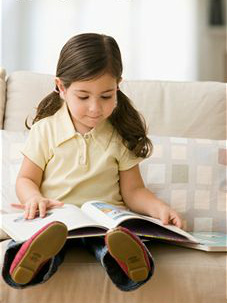 Your home contains countless skill-learning opportunities for your young child. You can make each room and each item in the room a learning activity for him if you simply stop for a few moments to show him how something works and let him try it for himself. Listening to explanations, trying out new things, and learning to use something for the first time help children develop both physically and intellectually. Taking care of things One skill that toddlers and preschoolers need is learning how to take proper care of their belongings and surroundings. Make a place for toys to go after they are played with, for clothes to go when they’re not being worn. Then help your child get in the habit of picking up his things when he is done, and hanging up his jackets, folding and putting away his pajamas in the morning, etc. Make learning these habits fun by being lavish with your praise for a job well done. Orderly surroundings give young children a greater sense of security and help them get an early start in forming good habits of their own. Your child’s environment will have a direct effect on his spirit (and yours too), so try to keep it clean, bright, and cheerful. Involving your small child in maintaining that order, beginning with little things, teaches him responsibility for himself and his surroundings. Helping him learn to perform the skills and tasks needed in everyday life also helps him learn new skills, improves his coordination, and teaches him consideration for others. Small children are usually very happy to help around the home and can assist in many needed chores that provide learning experiences. Teach your toddler the art of moving things, such as his small table and chairs, safely, skillfully, and quietly. Teach him to count as he hands you clothespins while you hang up the laundry. Let him help Daddy wash the car. Teach him about food, vitamins, and the importance of cleanliness as he helps prepare the salad for dinner. Daily household chores can be fun learning activities for little children: dumping the waste baskets, cleaning, tidying, sweeping, polishing, dusting, folding clothes, setting tables, washing dishes and clothes, and making beds. When it’s time to clean his room, your toddler or preschooler can help wipe down his toy shelf and wash the plastic toys. Low hooks and shelves for his towel, washcloth, soap, toothbrush, and clothing can turn a dependent, whiny child into a more content and helpful one! Teach your child the proper way to do each task from start to finish. Studying all the different aspects of folding clothes or wiping up dust is very interesting, even absorbing, to a child of two and a half to four years old. He will need time to learn to do it himself. His first tries can’t be expected to be too proficient, but children will gladly try to imitate the correct way of doing things if they are carefully shown how to. Take a “childview” of life Remember that a child often has a different reason than an adult would have for doing something. Often he simply enjoys doing the activity and is not as outcome-motivated as adults tend to be. The activity itself is often reason enough for doing something; finishing what he starts is not so important to him. Sometimes adults become impatient with children for their slowness in doing a task. They can’t see why a child doesn’t just hurry up and finish what he is doing. The child may have a very good attention span for his age, but he may not be focusing his attention on the same thing you are. You may want him to finish some activity because you need to move on to something else, but he may not be so interested in rushing through a perfectly enjoyable activity or moment just to begin something else. If you need to hurry him along, you should take time to explain why you want him to speed up, and how he also will benefit. Try not to rush your child through his day and constantly be pulling him away from absorbing things he is engaged in. Give children time to learn, time to observe, explore, and experience. Don’t rush them through a nature walk, or you may miss something very important. Take full advantage of God’s creation: the sights and sounds, creatures small and great, wind and weather, sunshine and rain. Think back and remember what experiences you had as a child that stand out in your memory, such as going barefoot in rain puddles, or pretending leaves in the tiny stream were boats on a wild river. Give children time and opportunity to learn from the greatest teacher of all—the Creator and His creation. Excerpts of the book "Keys to Toddlers and Preschoolers" by Derek and Michelle Brooks. © Aurora Productions. Used with permission.
0 Comments
 With all that there is to do in your busy lives, it’s sometimes easy to see your children as just one more thing you must take care of, and if you’re faced with a particularly hectic day, the simplest course of action can seem to be that of letting them entertain themselves with toys, videos, or games, while you take care of the business of the day. What you need to realize is that what you pour into your children each day is what helps to prepare them for their future. The love, concern, discipline, and attention that you fill up your child’s life with, is what helps them to mature into the person they’ll become. If you are too busy to give your children the time and love that they need, you’ll miss out on one of life’s best investments; while you may meet other expectations of your day, those things will not live on eternally. It’s what you pour into your children that lives beyond today. You will always have work to take care of—the house to clean, a pile of clothes to launder, and bills to pay—but you won’t always have your children with you, and you won’t be able to regain the moments you lost “because you were too busy.” Every day, every moment, counts in helping to build your child’s future, and making them who they will become. The more you pour into your children, the more they will learn. You can use every opportunity to teach them something; and you can fill up their lives with happiness by the zeal and inspiration you exude in the way you live your life. Caring for your children can also teach you many things personally; in fact, many a wise soul has been taught a lesson through the sincerity, love, and simplicity of a child. Always remember that the years of childhood are precious; you’re helping to shape your child’s future by what you give to them, so make it count, make it worthwhile. You’ll never regret it. © TFI. Used with permission. Establishing Guidelines for Safe Internet Usage
The end objective of guidelines for Internet usage is not to put countless rules in place, but rather to teach your child to make responsible choices for him- or herself, which will safeguard him or her in later years. A prime responsibility is to teach your children the value of making the right choices. Your children need to understand why something is right or wrong and from that understanding learn to make decisions. The motivation for making the right decisions online should be based on a clear understanding of what is right and safe and what is dangerous and intellectually unhealthy. You must teach your children how to responsibly use the Internet because the Internet is part of today’s world and technology, and that’s not about to change. A good working knowledge of the Internet and its uses will prepare your children for the inevitability of their use of it in this age of technology. Beginner Preparation Tips for Parents * As much as possible, place the computer your children use in a location where it’s easy to supervise them during their online times. You may want to limit the times of the day when the computer is connected to the Internet, so that all computer time does not equal online time. * When your preteens use the Internet, teach them to have a purpose for what they’re doing online, so that they’re not distracted by the sheer quantity of information and lures. Children must understand that the Internet is not a well-organized, accurate, and safe environment. The Internet is a huge network of computers that make a wide range of information available. Sometimes the information is good and helpful, but sometimes it’s not, and can be harmful or false. * You may want to bookmark a couple of reputable educational sites or online encyclopedias and stick with going to those sites for the information you’re looking for, rather than going through a search engine. As a parent you could invest some time into this on behalf of your children, and keep these sites as “Favorites” in your Web browser. This can also be applied to sites on recreational subjects, personal hobbies, or interests. * As children get older, teach them how to use their time online efficiently. It’s easy for anyone to get pulled into the vast amounts of information, email communications, chats, or simple personal interests online, to the point that the minutes and hours fly by. In this age of technology, teaching your children (and personally learning) to use your online time wisely is important. If you can teach your children these principles during childhood, it will encourage good lifelong habits. Internet Concerns and Dangers Though the advantages and benefits of the Internet are obvious, the potential pitfalls cannot be ignored. Being informed of the hazards will help you to safeguard against them, and teach your children to do so as well. Inappropriate Content A hazard of browsing is that you or your child might land on a site that has inappropriate content, or be redirected to an inappropriate site. Identifying the Risks Data suggests that 90 percent of kids between 8 and 16 have seen inappropriate photos and content while browsing. What kind of browsing practices can have these results? According to one study, kids encountered offensive images most often: * while surfing, * when they had misspelled Web addresses, * when they clicked on a link in a Web site. Safeguarding Strategies * Effective strategies can be used to reduce the possibility of accidental exposure to such materials, such as, teaching effective search, Web access, and email handling techniques. * Children and teens should know how to rapidly respond to any accidental exposure to limit the potential danger of such exposure (i.e., restart their browser). Help them develop a moral stance that leads them to ignore inappropriate content when they come across it, and move on. * Set up the search preferences of the search engine you use to implement the “safe search” features, which may provide some level of protection against accidental access. * Explain to your child that when he or she searches for information using a perfectly appropriate term, the search results could lead to inappropriate sites. To avoid this, your child should carefully read the site description and only click on a link if he or she absolutely sure it will be okay to go to this site. If your child can’t tell for sure, he or she should either not click on it or seek parental guidance. Dealing with the Fallout At some point in your preteen’s life he/she will encounter inappropriate material, whether online, through magazines, TV, etc. It’s not a matter of if, but when. Do not overreact when this happens. Such occurrences should be viewed as opportunities to address these issues and teach your children the values and reasoning behind your safeguards against inappropriate material. Children need explanations, counsel, and direction, tailored to their particular needs and age. If you are uncomfortable discussing these matters with your child or teen, there is information online or from other sources (books, professionals) that can provide further guidance as to how to go about it. The Internet has become integrated into daily living, making accessible information that was previously difficult or costly to obtain. From researching educational topics to playing online educational games, looking up reference material, researching how-to aids, finding useful resources, watching video clips, etc., the Internet has increased and enhanced learning opportunities, as well as provided a means to stay in touch with family and friends.
It would be unreasonable to ignore the ways that the Internet can be used for good. At the same time, there is not only great potential for it to be an avenue for ungodly influences, but there are also many practical security and safety issues to consider. Instilling Values Your children are inexperienced, which is why they need your guidance to instill in them the right set of values to apply to their online times. This set of values that you instill in your children, rather than specific rules, will in the long run provide them with the greatest safety measure. One day you will not be there peering over their shoulders checking what they do; before long they will be teenagers and adults and will have to make the choices to do right and to steer away from danger based on personal conviction rather than fear of punishment. You have the privilege of shaping your children’s values and morals; do so wisely. Social concerns Socially, the Web can become a world of its own, representing a wealth of possibility and discovery for children and young people who engage in online activities. Shy children who have a hard time expressing themselves in face-to-face communications may have little difficulty doing so online—or to the contrary the Internet can encourage such shyness, insecurity, and low self-esteem, because it does not provide opportunities for them to grow in their verbal communication and presentation. There is also the danger of Internet addiction, and the concerns of providing your child with a balanced array of experiences and activities to ensure healthy development in all areas of his or her life. It’s important to realize that children need time experiencing life away from the computer and Internet, where they can partake in practical life skills, develop social skills, enjoy outdoor recreation, etc. The computer and the Internet should never replace the fundamentals of a child’s upbringing that provide experience and perspective on life and living it to the full. How Much Time? Aside from safety issues and practical concerns, another area of your child’s Internet usage that you, as parents, should monitor and evaluate is the amount of time that your child spends at a computer. Inordinate or unnecessary exposure to computers at a young age can create an appetite for continual visual stimulation, which can hinder your child’s desire for a physically active lifestyle or your child’s social development. Providing your child with a wide range of real-life activities is in itself one of the most important safeguarding strategies to not only keeping the aforementioned Internet concerns and dangers at bay, but ensuring your child’s healthy development in all areas of his or her life. Childhood is meant to be an active time, filled with fun, activities, adventure, challenges, and thrills—not the lethargy-inducing pull of computers. When children are young, they are forming their mindsets. They are deciding how they will approach life, what they’ll do with their lives, and spending hours in front of a computer is really sad. You have to instill that desire for an active lifestyle by doing activities that keep them stirred up. They’ll balk and want to sit down at the computer, but it’s up to you to find ways to energize their lives, to make them want to go outside and have fun rather than sit in the house all day and waste away. Parental Guidance One of the best methods for controlling what your child is exposed to on the Internet is old-fashioned parental guidance. You know what is appropriate for your child to view and what isn’t. There are a variety of programs available to help parents control the access their children have to the Internet. This type of software is designed for a range of actions, from filtering out sites that are not child friendly to restricting the amount of time that a child spends online. Any filtering systems that you consider for your situation should be in addition to your supervision and the guidelines concerning length of time, purpose of use, etc., that you’ve instituted with your child. The Internet can be a wonderful education and reference tool, and installing software that will filter out inappropriate material will enhance the quality of your Internet searches and online time. If you do decide to install filtering software on the computer your children have access to, you could use this opportunity to teach your child why you are doing so. A danger lies in thinking that after installing such software that your preteens are now safe and no longer need supervision and instruction from you. The software will only do a measure of safeguarding. So while the filtering software will alleviate some concerns, as the parent it is your ultimate responsibility to ensure that your children learn how to protect themselves from inappropriate material later on in life when they may not have filtering or other forms of external constraints. At such times they will also need to have a good understanding and personal conviction as to why inappropriate sites should be avoided.  By Bil Keane In the nearly 30 years that I’ve drawn the syndicated cartoon “The Family Circus,” I’ve learned a lot about love. I’ve found it in my own family, and frequently what I’ve observed has provided the basis for a cartoon with Billy, Dolly, Jeffy or PJ. But I make no secret about it—when it comes to love, my greatest inspiration, and the model for “Mommy,” has been my own wife, Thel. We have five children (and now four grandchildren), and when they were younger, people often wondered how Thel managed with so many. I often wondered too. Whether she was soothing the hurt of a scraped knee, sitting in the audience at a school play, or helping with homework at the kitchen table, Thel was always there for us. And the more she did for us, the more she seemed to have to give us. That was how I came upon one of God’s paradoxical laws of love. Real love doesn’t come in limited, finite amounts. It can’t be used up so there is no more. Instead, in a manner that defies physics, the more love you give, the more you’re able to give. Like enthusiasm that fosters enthusiasm, kindness that inspires kindness, cheerfulness that inevitably spreads, love increases when it’s given away. I tried to put all that in one of my cartoons. There is Mommy, a full bag of groceries in one hand, her purse in the other, and Billy, Dolly, Jeffy and PJ tugging at her knees. The woman at the left asks the question, “How do you divide your love among four children?” And Mommy’s answer, real words to grow on: “I don’t divide it. I multiply it.” ***** The Essence of Love All the best things in life come packaged in a ribbon of risk. You untie the gift, you assume the risk, and equally, the joy. Parenthood is like that. Marriage is like that. Friendship is like that. In order to experience life in the full sense, you expose yourself to a bottomless pit of vulnerability. That is the essence of true love.—Kristin Armstrong  My husband and I pray daily for our girls' safety, and I'm sure those prayers are what have kept them from having more accidents. It's possible, though, that I have also considered my kids exceptions--not to the rules, goodness no!--but exceptions in that they never seemed to do the typical silly little-kid things that lead to accidents or trouble. Like putting things in their mouths. I suppose I should have seen the warning signal--Lauren, two-and-a-half, snatching up a penny from the floor and gleefully popping it into her mouth. Fortunately she was within arm's reach. I got it out, and Lauren got the appropriate scolding, complete with an explanation of "dire consequences." Still, nothing could have prepared me for what happened that night. My husband and I were getting ready to go out for the evening. The girl's room was darkened, and the kids were squirming in their beds, like they always did. Would they be asleep by the time the babysitter arrived? Probably not. Sudden Kimberly called out, "Mommy! Mommy! Lauren is choking!" I grabbed Lauren and asked Kimberly what had happened. "Lauren swallowed a coin!" she replied. My mind shut down. I had read and reread--probably five or six times--an article on how to help a choking child, but when I needed it, I couldn't remember a word. I carried Lauren to the lighted hallway and screamed for help. The worst was not to happen, thank God! Lauren started coughing and I remembered that if choking children can cough, they usually cough up whatever they're choking on. Two or three seconds later a quarter popped out and rolled onto the floor. I couldn't stop crying--or thanking the Lord for His mercy! Long after the kids were back in bed, still sobbing and hugging each other in a tender display of preschool sisterly love, "what ifs" raced through my mind. A choking child can't cry out. The darkened room, me in a hurry to get myself ready for our evening out, my husband already waiting downstairs--what if Kimberly hadn't noticed that Lauren was choking? I might not have heard what was happening until it was too late. What if, instead of the quarter, Lauren had swallowed the penny I found in her bed when I tucked her in the second time? The smaller coin could easily have gotten lodged in her windpipe. Could I have gotten it out before it was too late? What if we'd already gone and the babysitter hadn't heard Kimberly calling for help? I am now a wiser and warier parent. I learned to not assume that my children would never do foolish, childish things that could put them in danger. I also have a renewed appreciation of the love and mercy of God, for His tender loving care, and especially for the way He answers our daily prayers for our children's safety. When faced with the unexpected and the matter is all but out of our control, having Jesus and prayer makes all the difference! Written by Jasmine St. Clair; originally published in Activated magazine. Used with permission.
 Reading is perhaps the primary skill that is needed for a good education, as much of learning is based on the ability to read. As parents and teachers we should do our best to expand our children’s thinking processes and help them to communicate their feelings and ideas. Children who grow up in an environment where a variety of reading materials are made available are more likely to develop a greater interest in reading than if they do not have that input. They will also progress more quickly if they have been read to from an early age. Simple books that are of special interest to children can also help them to begin to learn to read, by encouraging them to point out any words they begin to recognize. A cardinal rule in teaching a child to read is for the parent (or teacher) to approach it as a fun, joyous, and happy time to be together. When teaching reading, a parent should never forget these things: * Learning is life’s most exciting game; it is not work. * Learning is a reward; it is not a punishment. * Learning is a pleasure; it is not a chore. * Learning is a privilege; it is not denial. Children differ in how they progress in reading, but one thing remains constant: Your personal interest and attention as the parent or teacher can make all the difference. Almost any approach you take to teaching reading will succeed if your child is happy, motivated, interested, and enjoys the experience. Many people believe that young children may not have the attention span required to learn to read. However, if your times of learning are active and not drawn out, you may find out that the opposite is true, and your children will associate learning to read with enjoyment, which will help keep their interest, and will increase their desire to learn. Young children are much less awed by reading than older children, and do not consider it a subject full of frightening abstracts; instead, they view it as another exciting thing to learn. One key to success is to make sure your children know they are making progress. When they are praised for their accomplishments, children are then motivated to continue learning. Beginning to read can be particularly fun for small children as they start to see all the new words they are able to recognize and read on their own. At the end of a reading session, a simple review of new words encountered, a liberal application of praise for progress made, a sneak peek at what they have to look forward to next time, and an affectionate commendation in a hug—all these are great motivators for most children. Our brain is like a computer; it receives extensive information on a daily basis, and the more it receives, the greater its capacity to receive becomes. Teaching reading during the one to five age bracket is very effective. Young children are linguistic geniuses, and by the age of five they have usually learned one language (or even two or three), sports, simple mathematics, basic writing skills, and much more. Their ability to learn is at its peak, and they have the potential to learn more quickly than they would at a later stage of their lives. Young children can learn almost anything at an early age if it is presented in a clear, informative, and factual manner. Realizing that makes us aware of the great potential in children, and also the great responsibility of teaching a child. Dos of reading: * Be joyous! Love teaching the children that you are with. * Reward a child for success by lavishing praise on the child. * Be enthusiastic. * Eliminate possible distractions. Be sure that you have the child’s full attention. * When teaching children to read, it’s important that they learn to read from left to right. Use your finger or a pencil, and move it under the words to guide their eyes from left to right. Don’ts of reading: * Don’t bore the child by going too slow. * Don’t test the child. * Don’t continue a session if the child loses interest. * Don’t pressure a child to learn. Click here for free readers for young children! By Derek and Michelle Brookes, compiled from Early Bird Readers—A Teacher and Parent’s Handbook Children need—and appreciate—a clearly defined standard of behavior. Often misbehavior is just a child crying out, “Show me the way!” Here are some tried and proven parenting basics:
1. Set clear boundaries. Set clear boundaries as to what your children are allowed to do at home, and set reasonable punishments for crossing them. You may not have much control over what goes on outside your home, but you can set the standard for acceptable behavior and attitudes inside your own house. 2. Create a link of honest, open communication with your children. If your children are honest with you, you have a much better chance of knowing what goes on when they are away from home. They should feel that they can tell you anything. You may not always agree or allow them to do everything they want to, but they shouldn’t be afraid to confide in you. The secret of establishing such communication is to learn to listen. As a parent, one of the greatest gifts you can give your children is your sincere interest in them and their problems, as evidenced by your undivided attention whenever it’s needed. By simply listening—really listening—you are telling your child: “I want to understand and help you. I think you are worth listening to, and I want you to know that I have faith in you. You can always talk to me because I love you.” Ask questions. When communicating with children—or with anyone, for that matter—asking questions helps to draw them out and shows your concern and interest in them. Get them to talk. And when they are asking you questions, be careful not to overly philosophize, pontificate, or pretend to be something you’re not. Just stay simple! Show love and understanding. And avoid offering any advice that you wouldn’t want to apply to yourself. Learn to present your advice or answers in ways that are as easy as possible for them to accept. 3. Find a balance in what to allow and disallow. Pray for God’s guidance as to what activities are harmless, which ones you need to monitor and limit, and which ones you need to forbid. You will need to find a good balance in the things you allow your children to do, especially when they are away from home. Completely forbidding your older children and teenagers to do certain things might not work and could cause them to rebel and do it anyway behind your back. It may be better to agree on reasonable limits together, and then hold your children to them. 4. Don’t be overly alarmed by outward appearances. Don’t be overly alarmed by behavior that’s different but not bad or harmful. If you show yourself tolerant of things that are perhaps not to your own liking but are basically harmless, then your children will be more apt to comply when you put your foot down about other things that are definitely wrong. You might not like the way your preteen daughter dresses, for example, but that’s not the issue in her eyes. Fitting in with her peers is. Ask God to help you see beyond surface appearances and to give you patience and self-restraint to let relatively trivial matters pass. 5. Expect and allow a certain amount of experimentation. Not all experimentation is bad; it plays a big part in the growing-up process. Try not to overreact when your older children say or do what to you is the unthinkable. Quite often children like to be shocking just for the sake of it, hoping to get a rise out of you. If you show yourself able to take things in stride, many issues will resolve themselves on their own. 6. Let your children know you love them unconditionally. Children who get their needs for love and attention filled at home have far fewer problems. Assure your children that you will continue to love them no matter what they do, and that you will be there for them. Part of that love is not allowing them to do things that you know to be harmful, but at the same time reassuring them that you will never stop loving them. When your children put you to the test and find that your love holds even when they displease you, this helps them feel secure. They will then be more likely to stand up against negative peer pressure and make the right decision next time. 7. Get to know and accept your children’s friends. Win the respect and friendship of your children’s friends, and they may find your home a welcome retreat. The noise level and food bill may go up, but at least you’ll have peace of mind in knowing where your children are and what they’re up to. If you are generally accepting of your children’s friends, then if on occasion you have to limit their association with a particular boy or girl who is affecting them negatively, they’ll be more likely to comply with your wishes. 8. Minimize ungodly influences. Select worthwhile movies, TV shows, music, and computer games for your children when they are young and you still hold the remote control. They may rebel or be drawn to less godly amusements later, but you will have given them a good foundation. Discuss such recreational activities with your older children and make choices together, as much as possible. If your children understand and respect your reasons for not allowing a certain thing, they will be much more apt to comply when you’re not watching. Of course, it is also important to help provide alternative activities that are both fun and worthwhile. 9. Teach your children to have conviction. In order to stand up against negative influences and peer pressure, your children need to know how to explain and defend what they believe—what they consider right or acceptable, and why. They may not always see eye to eye with you, but if they understand your position on the issues and see you have conviction, they will be more likely to buck negative peer pressure. It will also help them know how to explain you to their friends. You can’t expect your children to always do the right thing in difficult situations, but praise them when they do have the conviction to do so. Let them know you understand how difficult that is, and that you’re proud of them. 10. Teach your children consideration. How you treat others, and especially your children, greatly influences how they will treat others. Here are some questions to ask yourself when you are talking to your children: “How would I feel if someone were treating me or talking to me the way I am to my child now? Am I thoughtful about how I talk about other people in front of, or within earshot of my children? Do I tease my children or make fun of them or make jokes about them that could make them feel bad?” Children often argue among themselves—contradicting, belittling, or criticizing what the other has said. Sometimes they are just arguing to be arguing or trying to show their superiority by putting the other one down. Children need to learn that it is not good to put themselves up as being better than someone else. Unless instructed and corrected, children can be especially unkind toward people who have handicaps or obvious physical differences, particularly other children. Learning what not to say and when to ignore something is a very important lesson that children need to learn early in life. Teach your children to treat others as they would like others to treat them should they have that same problem or be in that same embarrassing situation. Often when children realize in some personal way how their actions hurt others, they are more careful about what they say and do, and are generally more thoughtful of others. Excerpted from the book "Keys to Kids" by Derek and Michelle Brooks. © Aurora Productions. Used with permission. Many mothers are tempted to feel that everything they do for their children goes unnoticed and that they are literally invisible. This encouraging video shows just how important a mother is. |
Categories
All
Archives
March 2024
LinksFree Children's Stories |



 RSS Feed
RSS Feed
